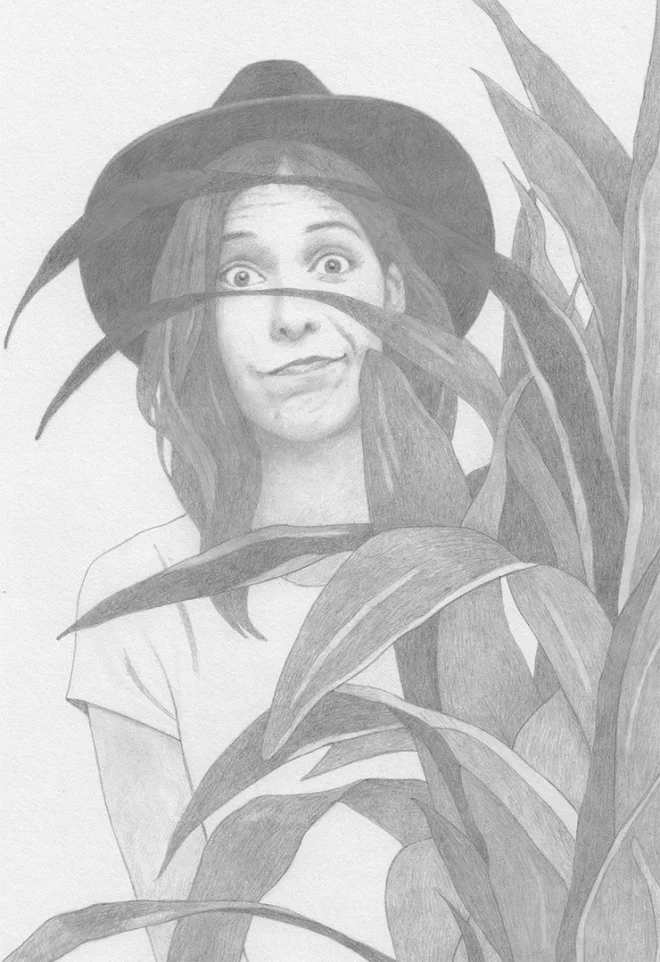New plant, huh?”
She threw a rather skeptical look across the aisle from over a pair of taped-up readers, and clutched her purse closer to her small, wiry body. She was surrounded by shopping bags and the faint smell of onion.
“Yep, just, you know, getting her home.” I adjusted the nursery pot at my feet and smiled through the mess of wide, palm-like leaves in a way that I hoped conveyed commuter solidarity but that felt a little grimace-shaped in the end. That was fair enough, really, considering the circumstances.
I shifted my knees to make way for two teenagers moving toward the back. We were passing the high school, I calculated, which meant only ten stops to go. The woman across the aisle turned away, and I watched her in profile, her brow furrowed and her mouth moving silently.
As a studio-apartment gardener with no car, I’ve done my time carrying green things home on buses over the years. People love plants, and I’ve had my share of smiles and approving glances. But this was the first time I’d tried to carry a freshly-watered, five-foot-tall plant home on the Seattle City Metro.
Usually I brought home smaller finds. The occasional daring pothos, sure, but mostly cacti and succulents. I’ve always preferred small plants with big attitudes for the end-less string of small city apartments I find myself in. I like unusual beauties with strong survival instincts that might make a go of it, however unlikely, in northeast-facing or basement windows, or crammed along shelves above heating vents, or below seventh-story windows angled like magnifying glasses in the evening sun. Independent and patient beauties. Dangerous beauties. Beauties buried behind a crown of spines.

But this? This loose, sprawling, lush, and unwieldy thing? Well, a cactus it was not.
I bought it because of him.
Him. The photographer that had come and gone like a flash flood.
I bought it because of heartbreak.
As fierce and resilient as they are, cacti do not always comfort. This leggy green beauty was going to turn my tiny, spiny desert into a 500-square-foot jungle where I might sink into the Summer in softer peace, tending to what it needs.
The bus lurched to a sudden stop and I slid three inches to my left, careening uncomfortably close to the man hunched beside me. The towering plant, oblivious to our close quarters, rushed forward, too—and smack!
Fat green leaves bopped the man right in the face.
I yelped and scooched sideways to tuck the plant back tightly between my feet. “I’m so sorry,” I mumbled, but it was clear the damage was done. The man rolled his eyes and stared harder at the book open in his lap.
I’d met the photographer at Adeline’s block potluck. It was the season of gratitude and warm pies and sides, the holidays tumbling closer and closer as the days turned colder and wetter. Which meant, of course, it had been a time to decide on someone to cozy up with or else go it alone. Having wintered alone for plenty of years, this time I leapt right in.
We’d talked about cooking that night, and city exploration and local art exhibits. It was all quite interesting stuff, really, although I’d been hopelessly distracted watching his lips tuck over an especially crooked tooth when he smiled, and wondering how he took his coffee in the mornings.
A whirlwind of days and nights had followed. I’d soaked up the excitement and energy eagerly, storing the heat of it in my cheeks and chest like Summer sun. I’d fallen hard and fast and fully.
And then, as is the way with flings, the season ended.
By Spring, the photographer was gone.
The past few weeks, in the quiet of my apartment, my patient tenants had offered what camaraderie they could, but this parting seemed to need something new. Something specific. Something different.
Something lush and soft to lean into. Something wilder and louder than before. Something gushing and fearless, regal and unselfconscious.
Hence the bird of paradise. This wild beast of a plant pressed against me. Only five stops to go.
See, cacti can mean many things. As gifts, they’re said to rep-resent warmth and unconditional love and protection. They’re quirky and steadfast. They need attention but don’t demand it.
I sing to them. I sit with them. I talk to them when there’s time in our schedules. In the growing season, Spring and Summer, I water them on Sundays while I drink my coffee, letting the soil soak and sigh. In the Fall and Winter, I water less and sing more, and we rest. But truth be told, cacti, like me, aren’t always conventionally consoling.
New circumstances, new seasons, call for new plans.
I imagined leaves draped over the bookcase, rising up along the wall to keep watch on the door, waving in visitors and giving a gentle nod to the neighbors whose windows faced mine. Extroverted and eager and green.
The woman awash in onion and groceries cleared her throat, and I glanced over obligingly. She was watching me out of the corner of her eye somewhat disapprovingly, and I smiled again until she lifted her chin back toward the window.
Behind her, I saw the stop approaching.
I reached up and pulled the cable, resisting an urge to stick out my tongue at the woman jokingly, and carefully grabbed hold of the sides of the pot while the bus shuddered to a stop.
As I stepped onto the sidewalk and turned to make my way home, I wondered, watching the world through thick leaves, if by some luck next Fall or Winter, with another shift in the season, this beast might even bloom. Wildly, loudly, and lushly.
Myself, as well. ❖


 Previous
Previous

